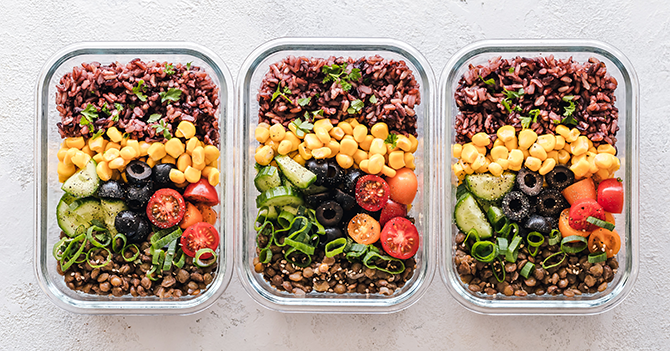A Beginner’s Guide to Cooking With Plant Based Chicken at Home
Wiki Article
All Concerning Healthy And Balanced Food: Advantages of Checking Out Plant Based Alternatives
The conversation surrounding plant-based diets has gained significant focus in the last few years. Numerous individuals are exploring the potential wellness advantages, nutritional advantages, and ecological influences connected with these dietary choices. As individuals end up being much more aware of their food's impact on wellness and sustainability, concerns arise concerning the functionalities of embracing such a lifestyle. What details modifications can one expect, and how might these selections reshape not just individual health yet likewise the planet's future?Recognizing Plant-Based Diet Plans
Although lots of people associate plant-based diet regimens primarily with vegetarianism or veganism, these diets can include a large range of eating patterns that focus on whole, minimally refined plant foods. Such diet plans frequently consist of fruits, vegetables, whole grains, seeds, vegetables, and nuts, while eliminating or restricting animal items. This adaptability permits individuals to customize their dietary options according to individual preferences and nutritional demands. Some might adopt a mostly plant-based diet while still sometimes consuming meat or dairy products, typically described as a flexitarian approach. The focus stays on including more plant foods, which can bring about a diverse variety of dishes and flavors. Recognizing these various interpretations of plant-based consuming is important for appreciating its availability and allure in modern food society.Health Advantages of Plant-Based Foods
The health and wellness benefits of plant-based foods are considerable, using a nutrient thickness benefit that sustains total health. Research indicates that these foods can improve heart health and play a vital function in efficient weight administration. By including a lot more plant-based alternatives, people might improve their dietary options and promote long-term health.Nutrient Density Advantage
Nutrient thickness plays an essential duty in the wellness advantages of plant-based foods, making them an engaging option for those seeking a balanced diet plan. Plant-based foods, such as fruits, vegetables, vegetables, nuts, and whole grains, are frequently rich in important vitamins, minerals, and antioxidants while being reduced in calories. This high nutrient thickness enables individuals to eat less calories while still satisfying their nutritional demands. In addition, these foods are loaded with dietary fiber, advertising digestive wellness and helping in weight administration. By incorporating nutrient-dense plant-based alternatives, customers can enhance their total health and wellness, support their body immune systems, and minimize the risk of persistent illness. Ultimately, the nutrient thickness of plant-based foods highlights their importance in a health-conscious way of living.Heart Health And Wellness Improvement

Weight Management Assistance
In addition to advertising heart health, a plant-based diet regimen can significantly aid in weight monitoring. This dietary strategy highlights entire foods such as fruits, vegetables, beans, nuts, and whole grains, which are usually lower in calories and greater in fiber compared to animal-based items. The high fiber content aids increase satiation, reducing general calorie intake. Moreover, plant-based diets are usually rich in crucial nutrients while low in harmful fats, making it easier to preserve a healthy and balanced weight. Sugar Free Sauces. Research suggests that people that adopt a plant-based way of life have a tendency to have reduced body mass indexes (BMIs) and experience more successful weight management contrasted to those who consume meat-heavy diet plans. Subsequently, embracing plant-based options is a calculated selection for reliable weight management
Nutritional Value of Plant-Based Components
Plant-based active ingredients are abundant in essential nutrients, providing a diverse range of vitamins, minerals, and antioxidants that contribute to general health and wellness. A contrast of healthy protein resources discloses that while pet items are commonly considered as superior, many plant-based alternatives provide adequate healthy protein and various other valuable substances. Recognizing the dietary value of these components can help individuals make informed nutritional selections.Necessary Nutrients in Plants
Nutrient-rich active ingredients discovered in plants use a diverse array of important vitamins and minerals that contribute substantially to total health and wellness. These components are rich in vitamins A, C, and K, which sustain immune feature, vision, and blood clotting, respectively. Additionally, plants supply essential minerals such as potassium, magnesium, and calcium, crucial for heart wellness, muscle mass function, and bone toughness. The existence of fiber in plant-based foods aids food digestion and promotes a healthy and balanced digestive tract microbiome. Antioxidants, located abundantly in vegetables and fruits, help fight oxidative tension and lower inflammation. Moreover, lots of plant foods are low in calories yet high in nutrients, making them a superb selection for those looking for to preserve a healthy and balanced weight while guaranteeing ideal nutrient consumption.Contrasting Healthy Protein Resources
Protein sources vary substantially in their dietary accounts, with plant-based ingredients offering unique benefits. Unlike pet proteins, which frequently contain hydrogenated fats and cholesterol, plant healthy proteins tend to be reduced in these harmful elements. Legumes, nuts, seeds, and whole grains are abundant in necessary amino acids, fiber, vitamins, and minerals. For example, lentils offer high healthy protein web content together with significant iron and folate, while quinoa is a full protein, offering all 9 vital amino acids. Furthermore, plant-based proteins are commonly accompanied by anti-oxidants and phytochemicals that support total health and wellness. The change to plant-based protein resources not only boosts nutritional consumption but additionally aligns with lasting dietary methods, reducing environmental influence and promoting long-term wellness benefits.Ecological Impact of Plant-Based Consuming
As awareness of climate adjustment expands, lots of people are exploring lasting nutritional choices that can substantially reduce their ecological impact. Plant-based eating has arised as a significant contributor to lowering greenhouse gas emissions, which are mainly linked with animals production. The growing of fruits, veggies, grains, and beans typically requires fewer resources, such as water and land, compared to pet farming. In addition, plant-based diet regimens can lead to decreased deforestation, as less land is needed for grazing livestock or growing pet feed. By moving in the direction of plant-based alternatives, customers can sustain biodiversity and advertise much healthier ecosystems. In general, accepting plant-based eating not just benefits individual wellness yet additionally stands for a vital action towards ecological sustainability and preservation initiatives.Conquering Common Misconceptions
While lots of people acknowledge the benefits of a plant-based diet, several misunderstandings typically prevent them from completely accepting this way of living. An usual idea is that plant-based diet regimens lack adequate protein; nevertheless, numerous plant sources, such as vegetables, nuts, and tofu, supply ample healthy protein. Furthermore, some presume that this diet regimen is pricey, when as a matter of fact, staples like beans, rice, and seasonal veggies can be rather budget friendly. An additional false impression is that plant-based eating is extremely restrictive, whereas it in fact offers a varied range of foods and flavors. Numerous worry that a plant-based diet might lead to deficiencies, yet with correct planning, people can get all needed nutrients, including minerals and vitamins, while delighting in a vast selection of tasty dishes. Broad Tips for Transitioning to a Plant-Based Way of living Making the shift to a plant-based way of life can be an enriching experience, though it commonly requires some support to browse the initial adjustments. People are urged to begin gradually, integrating more fruits, vegetables, vegetables, and whole grains into their dishes while lowering meat and dairy products intake. Meal planning is necessary; preparing an once a week menu can assist reduce the change and avoid final harmful i thought about this options. Discovering cooking techniques and brand-new dishes can also preserve and boost the experience excitement about plant-based eating. Furthermore, joining assistance teams or communities can provide motivation and share important suggestions. Finally, staying notified regarding nutrition warranties balanced meals, preventing deficiencies while fostering a healthy, rewarding plant-based way of life.Delicious Plant-Based Meal Ideas
Discovering delicious plant-based dish concepts can inspire people to welcome a much more nutritious diet plan. One preferred option is a hearty quinoa salad, including cherry tomatoes, cucumber, and a vibrant lemon-tahini dressing. One more fave is a full-flavored lentil stew, packed with carrots, celery, and great smelling herbs, excellent for a reassuring dinner. For morning meal, overnight oats made with almond milk, chia seeds, and topped with fresh berries supply a nourishing start to the day. Furthermore, a lively vegetable stir-fry with tofu and a range of vivid veggies can be a fast yet pleasing dish. Ultimately, creamy avocado toast on whole-grain bread, sprinkled with seeds and flavors, uses a basic yet savory treat. These meals display the selection and splendor of plant-based consuming.
Frequently Asked Concerns
Can a Plant-Based Diet Plan Provide Sufficient Protein?
The inquiry of whether a plant-based diet plan can give adequate protein is usual. Many sources, including vegetables, nuts, seeds, and whole grains, can fulfill protein requires successfully, sustaining a balanced and nourishing diet plan for individuals.More about the author
Are Plant-Based Diet Regimens Appropriate for Children?
The viability of plant-based diets for kids depends on cautious preparation. Sufficient nutrients need to be ensured, including proteins, vitamins, and minerals. With proper support, such diets can support healthy and balanced growth and advancement in youngsters.How Do I Eat in restaurants on a Plant-Based Diet regimen?
Dining out on a plant-based diet plan entails seeking restaurants with varied food selections, asking for adjustments, and discovering vegan-friendly options. Planning in advance and connecting dietary preferences can improve the eating experience while keeping dietary choices.What Are Usual Allergens in Plant-Based Foods?
Typical irritants in plant-based foods consist of soy, gluten, nuts, and seeds home - Plant Based Chicken. Individuals adhering to a plant-based diet regimen should recognize these allergens and check out tags meticulously to stay clear of adverse reactions and guarantee risk-free usageCan Plant-Based Diets Assist With Fat Burning?
Study indicates that adopting a plant-based diet may facilitate weight reduction because of its usually reduced calorie thickness and higher fiber material. This combination can enhance satiety, helping people handle their calorie consumption successfully. Lots of people connect plant-based diets mainly with vegetarianism or veganism, these diets can incorporate a broad variety of eating patterns that prioritize entire, minimally refined plant foods. Nutrient density plays a vital function in the health and wellness advantages of plant-based foods, making them an engaging option for those seeking a well balanced diet plan. Plant-based diet plans have been revealed to markedly boost heart health and wellness, as they usually include components that support cardio feature. In addition to promoting heart wellness, a plant-based diet can significantly assist in weight administration. A common idea is that plant-based diets do not have adequate protein; nonetheless, various plant resources, such as vegetables, nuts, and tofu, provide enough protein.Report this wiki page